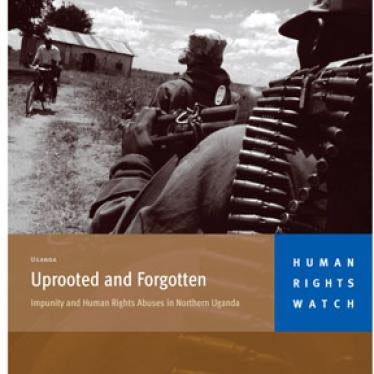Uganda, Africa’s “poster child” for successful reform, has fallen on hard times. After being lauded internationally for success in turning around a country destroyed by violence, repression and HIV/AIDS, Uganda’s president Yoweri Museveni, and the National Resistance Movement he controls, have let this progress unravel.
Donor governments that once praised Museveni are now cutting aid in response to the back peddling on democratic reform, symbolized by Museveni’s insistence on running for a third term and the possibility that this will cause the entrenchment of a one-party state. The Global Fund for AIDS suspended its programs to Uganda due to “serious mismanagement” of funds. Opposition politicians, journalists and those who speak out against the government are facing detention if they tread in “prohibited” areas.
Nowhere have Museveni’s policies failed more severely, and with more devastating consequences for Ugandans, than in the war in the north against the Lord’s Resistance Army (LRA). The LRA and its predecessor have been waging this war since Museveni took power in 1986. Despite 19 years of fighting, several offensives by the government Uganda Peoples’ Defence Forces (UPDF), and intermittent efforts at peace talks, the war sputters on, periodically costing many lives. In this neglected and war-torn corner of Uganda, the livelihoods, health and education of its citizens and their standards of living have plummeted instead of benefiting from the reforms enjoyed by the rest of Uganda.
The LRA continues to commit crimes of an atrocious nature. It almost exclusively targets civilians, who it kills, beats, mutilates and abducts for use as child soldiers or sex slaves. These attacks against more than 1.5 million civilians confined to displaced persons camps in northern Uganda — and many others in villages in northern Uganda and southern Sudan — continue to kill and terrify the victims and destroy and loot their property. The Ugandan army, which is deployed in or near every displaced persons camp in northern Uganda, is charged with protecting civilians. It has failed to live up to this responsibility. What’s worse, instead of effectively protecting civilians from the LRA’s vicious assaults, UPDF soldiers have engaged in abuses of their own, often beating, raping and even killing civilians with near total impunity. The government of Uganda dismissed these allegations by stating that “most complaints are fronted by opposition Members of Parliament to malign the UPDF.”
No effective structure exists in the camps or in the system of government to hold the army accountable for its crimes, despite government assurances to the contrary. The UPDF rarely investigates or prosecutes its personnel. The police are few and far between in rural northern Uganda; the criminal justice system is understaffed and under-resourced and like other civilian institutions in the north is hesitant about acting against allegations of army abuses. The Ugandan government has taken steps to hold the LRA accountable for its crimes — by referring the situation in northern Uganda to the International Criminal Court — but the UPDF must likewise be held accountable for its crimes.
Human Rights Watch documented violations committed by soldiers of the 11th Battalion of the UPDF while stationed at Cwero and Awach camps in Gulu district. The 11th Battalion, rather than protecting civilians from the LRA, treated them in a callous and brutal manner, by killing, beating to death and torturing camp residents, in some cases because they were out past curfew. This is a far cry from what Army spokesman Lt. Col. Shaban Bantariza recently called “cordial civil-military relations in the north.” In response to the concerns of Human Rights Watch and others about this Battalion, the military moved the battalion from Cwero and Awach—without any punishment or investigation of the allegations of misconduct, as far as the victims know.
The international donor community has also been too slow to respond to the 19-year human rights crisis in northern Uganda, and for many years the funding for the humanitarian crisis was far from what was necessary. Donors should support an enhanced police presence and independent judiciary in the north to see that perpetrators of abuses do not escape punishment. Agencies such as UNICEF and OCHA are moving to an expanded protection and monitoring presence in the north and the U.N. Office of the High Commissioner for Human Rights’ plans to deploy human rights monitors to the same region. This is a belated, albeit positive, development.
One of the programs promised in Museveni’s run for president in 2001 was the professionalization of the army; another was bringing the country together by ending ethnic and regional divisions. The continuing war in northern Uganda, which has left as many as 95 percent of the population of some northern districts suffering in camps, and the abuses committed by the UPDF both demonstrate that these promises have been ignored as far as the north is concerned.
The Ugandan government has an opportunity now to ensure that those in the army who have committed crimes against civilians are brought to justice. This will not only go a long way towards improving relations between the northern population and the southern-based government, but it will also lead to more professional and law-abiding armed forces. While addressing the impunity and lack of protection pervasive in the north is a political opportunity for Museveni and the Movement, it is also an obligation.







